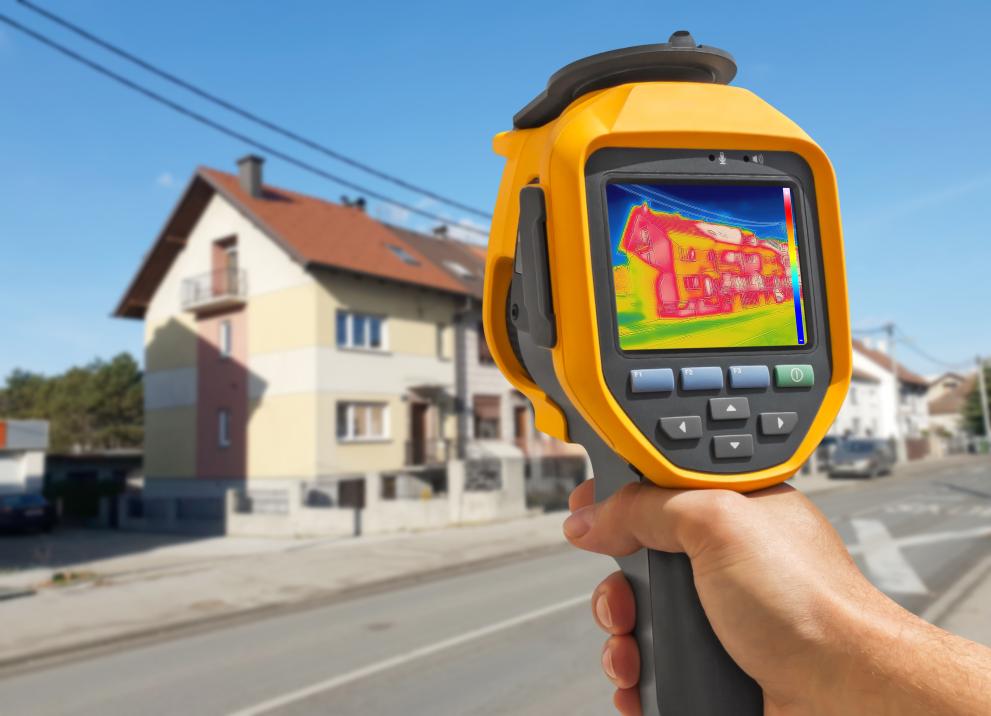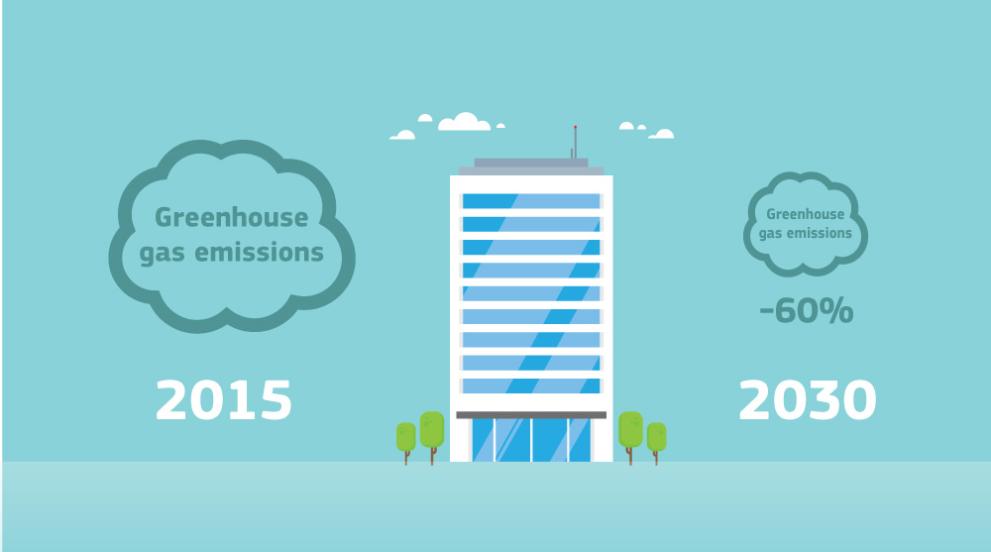Buildings are the single largest energy consumer in Europe. The building sector is therefore crucial to achieving the EU's energy and climate goals.
Key facts on energy and EU buildings
85% of EU buildings were built before 2000 and amongst those, 75% have a poor energy performance. Acting on the energy efficiency of buildings is therefore key to saving energy, reducing bills for citizens and small enterprises and achieving a zero-emission and fully decarbonised building stock by 2050. These facts, and those below, come from Eurostat energy balances and EEA Greenhouse Gas Inventory, 2023.
To boost the energy performance of buildings, the EU has established a legislative framework that includes the revised Energy Performance of Buildings Directive (EU/2024/1275) and the revised Energy Efficiency Directive (EU/2023/1791).
Together, the directives promote policies that will help
- achieve a highly energy efficient and decarbonised building stock by 2050
- create a stable environment for investment decisions
- enable consumers and businesses to make more informed choices to save energy and money
Revised Energy Performance of Buildings Directive
The revised Energy Performance of Buildings Directive (EU/2024/1275) entered into force in all EU countries on 28 May 2024 and helps increase the rate of renovation in the EU, particularly for the worst-performing buildings in each country.
It also supports better air quality, the digitalisation of energy systems for buildings and the roll-out of infrastructure for sustainable mobility. Recognising the differences across EU countries in factors such as the existing building stock, geography and climate, the directive allows governments to decide on the renovation measures best-suited to their specific national context.
Countries can also exempt various categories of buildings from the rules including historical buildings and holiday homes.

Crucially, the revised directive facilitates more targeted financing to investments in the building sector, complementing other EU instruments and fighting energy poverty by supporting vulnerable consumers. EU countries also must ensure that there are safeguards for tenants, such as through rent support or caps on rent increases.
The directive contributes to the objective of reducing GHG emissions by at least 60% in the building sector by 2030 compared to 2015, and achieving a decarbonised, zero-emission building stock by 2050. It works hand in hand with other European Green Deal policies such as the emissions trading system for fuels used in buildings, the revised Energy Efficiency Directive, the revised Renewable Energy Directive and the Alternative Fuels Infrastructure Regulation.

Other measures in the revised Energy Performance of Buildings Directive (EPBD) include
- the gradual introduction of minimum energy performance standards for non-residential buildings based on national thresholds to trigger the renovation of buildings with the lowest energy performance
- a binding target to increase the average energy performance of the national residential building stock by 16% by 2030 in comparison to 2020, and by 20-22% by 2035, based on national trajectories
- an enhanced standard for new buildings to be zero-emission and the calculation of whole life-cycle carbon for new buildings
- enhanced long-term renovation strategies, to be renamed national Building Renovation Plans
- increased reliability, quality and digitalisation of Energy Performance Certificates with energy performance classes to be based on common criteria
- the introduction of building renovation passports to guide building owners in their staged and deep energy renovations
- increased deployment of solar technologies on all new buildings and certain existing non-residential buildings where technically and economically feasible, and ensuring that new buildings are solar-ready (fit to host solar installations)
- a gradual phase-out of boilers powered by fossil fuels, starting with the end of subsidies to stand-alone boilers powered by fossil fuels from 1 January 2025
- one-stop-shops for the energy renovations of buildings for home-owners, small and medium-sized enterprises and other stakeholders
- further roll-out of recharging points for electric vehicles in buildings, removing barriers to their installation, enabling smart charging and introducing measures for bike parking in buildings
- data collection and sharing, to improve knowledge on the building stock and awareness on energy consumption in buildings
Legislative timeline
- 28 May 2024
Revised Energy Performance of Buildings Directive (EPBD) entered into force
- 8 May 2024
The revised Directive was published in the Official Journal of the EU
- April 2024
- December 2023
Provisional agreement between the co-legislators on the EPBD revision
- October 2022
- May 2022
REPowerEU Plan, including the EU ‘Save Energy’ Communication
- December 2021
- July 2021
Delivering the European Green Deal (“Fit for 55” package)
- October 2020
- May 2018
The initial Energy Performance of Buildings Directive (EPBD) (EU/2010/31) was amended in 2018, as part of the Clean energy for all Europeans package. The amending directive introduced new elements and sent a strong political signal on the EU’s commitment to improving and modernising the buildings sector.
In October 2020, the Commission presented its Renovation Wave strategy, as part of the European Green Deal. It contains an action plan with concrete regulatory, financing and enabling measures to boost building renovations. The strategy aims to at least double the annual energy renovation rate of buildings by 2030 and foster deep renovation - another revision and strengthening of the EPBD is one of its key building blocks.
The Delivering the European Green Deal (or ‘Fit for 55’) package, presented in July 2021, further emphasised the importance of building renovation and also proposed a Social Climate Fund to support vulnerable citizens and small businesses in the green transition, including through the renovation of buildings, clean heating and cooling and the integration of more renewable energy.
The Commission published its proposal for a revision of the EPBD in December 2021. It sought to upgrade the existing regulatory framework to reflect a higher ambition and a more pressing need for climate and social action.
The REPowerEU plan, adopted in May 2022, further highlighted the need to improve the energy performance of the EU's building stock to reduce Europe’s dependence on fossil fuel imports.
On 7 December 2023, the co-legislators reached a provisional agreement on the revision. The directive was published in the EU Official Journal on 8 May 2024 and entered into force 20 days later.
Advantages of renovating buildings in the EU
Improving the energy performance of buildings not only saves energy and reduces energy bills, thereby reducing energy poverty and making Europe more energy independent, it also benefits the health and wellbeing of citizens by bringing living standards up to the 21st century for everyone.
Furthermore, investments in energy efficiency help stimulate the economy, support EU industrial sectors and create more green jobs. The EU’s construction industry contributes around 9.6% of the EU’s value added and employs almost 25 million people in approximately 5.3 million firms. Small and medium-sized enterprises (SMEs) in particular benefit from a boosted renovations market, as they make up 99% of EU construction companies and 90% of the employment in the sector.
Source: European Commission reports 2020 -2021.

Commission Recommendations
The Commission published 2 recommendations in 2019, including guidelines for EU countries related to these rules, to help countries transpose the Directive previously in force (2018/844/EC)
- Commission recommendation on building renovation (EU) 2019/786
- Commission recommendation on building modernisation (EU) 2019/1019
Energy performance of buildings standards
The Commission has established a set of standards and accompanying technical reports to support the directive called the energy performance of buildings standards (EPB standards). These are managed by the European Committee for Standardisation (CEN).
- Commission issues guidance on phasing out financing for stand-alone fossil fuel boilers from 2025 (17/04/2024)
- Article: In focus: Energy efficient buildings - delivering energy and cost savings for EU citizens (16/04/2024)
- Energy Performance of Buildings Directive adopted to bring down energy bills and reduce emissions (12/04/2024)
- New rules to boost energy performance of buildings (7/12/2023)
- Energy Performance of Buildings Directive (EU/2024/1275)
- Promotion of e-mobility through buildings policy (COM/2023/76)
- Proposal for a recast Directive on the energy performance of buildings (COM/2021/802 final)
- Implementing regulation on optional scheme for rating smart readiness of buildings C(2020) 6929 | Annex
- Delegated regulation on optional scheme for rating smart readiness of buildings C(2020) 6930 | Annex
- Recommendation on building renovation (EU/2019/786)
- Recommendation on building modernisation (EU/2019/1019)
- Amending Energy Performance of Buildings Directive (2018/844/EU)
- Energy Performance of Buildings Directive (2010/31/EU)
- Consolidated version of the Energy Performance of Buildings Directive
